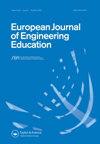Use of virtual labs to support demand-oriented engineering pedagogy in engineering technology and vocational education training programmes: a systematic review of the literature
IF 2.8
Q2 EDUCATION & EDUCATIONAL RESEARCH
引用次数: 2
Abstract
ABSTRACT Virtual labs offer the promise of increasing and expanding learning opportunities, yet more needs to be understood about pedagogical implementation in higher education settings particularly within engineering technology (ET), vocational education and training (VET), and related sub-baccalaureate programmes. There is little empirical research on educational efficacy and pedagogical incorporation of virtual labs focusing on ET and VET programmes and students. The purpose of this systematic review is to synthesise the use of virtual labs in ET and VET programmes, provide a comprehensive state of knowledge on pedagogical integration, and identify key characteristics. This work will support a greater understanding of the use of virtual labs in ET and VET programmes. An empirically based understanding supports postsecondary sub-baccalaureate engineering education pedagogy including scientific, social, student, and economic perspectives. These perspectives lead to research recommendations and implications specifically for ET and VET programmes integrating virtual labs.使用虚拟实验室来支持工程技术和职业教育培训计划中以需求为导向的工程教学法:对文献的系统回顾
摘要虚拟实验室有望增加和扩大学习机会,但在高等教育环境中,尤其是在工程技术(ET)、职业教育和培训(VET)以及相关的亚学士学位课程中,需要更多地了解教学实施。很少有关于教育效能和虚拟实验室的教学整合的实证研究,这些虚拟实验室专注于ET和VET课程和学生。本系统综述的目的是综合虚拟实验室在ET和VET项目中的使用,提供关于教学整合的全面知识,并确定关键特征。这项工作将有助于更好地理解虚拟实验室在ET和VET计划中的使用。基于经验的理解支持中学后亚学士学位工程教育法,包括科学、社会、学生和经济视角。这些观点导致了专门针对整合虚拟实验室的ET和VET计划的研究建议和影响。
本文章由计算机程序翻译,如有差异,请以英文原文为准。
求助全文
约1分钟内获得全文
求助全文
来源期刊

European Journal of Engineering Education
EDUCATION & EDUCATIONAL RESEARCH-
CiteScore
7.30
自引率
13.00%
发文量
64
期刊介绍:
European Journal of Engineering Education is published six times a year in print and electronic editions and provides an essential forum for dialogue between researchers and specialists in the field of engineering education, at European and worldwide levels. European Journal of Engineering Education is the Official Journal of SEFI, the Socièté Européenne pour la Formation des Ingénieurs (the European Society for Engineering Education). SEFI is a non-governmental organization whose aims are to develop information about engineering education, to improve communication and exchange between professors, researchers and students and to promote cooperation between the various institutions concerned with engineering education.
 求助内容:
求助内容: 应助结果提醒方式:
应助结果提醒方式:


